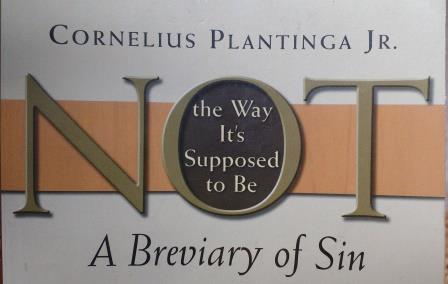“The veins of sin interlace with most of the rest of what’s wrong with our lives — through birth disorders, disease, accident and nuisance. Thousands of Third World children die daily from largely preventable diseases: out of laziness or complacency, certain grownups fail to prevent them. Thousands of First World children are born drug addicts: their mothers have hooked them in the womb. Some people with sexually transmitted diseases knowingly put their partners at terrible risk. It happens every day. Many accidents are, in retrospect, both accidental and predictable: somebody who needed to concentrate on his job in order to protect others (a pilot for example, or a lifeguard, or a ship’s captain) got drunk instead, or careless, or wholely preoccupied. Often, a number of such factors combine in some lethal and intricate way to bring havoc to human well-being.”
Cornelius Plantinga helps us look at sin and how it affects, and corrupts, the beauty and design of God’s creation. Most of us do not hear as much in our churches about sin as our grandparents did. It is at the root of much pain and suffering in this world. “Self-deception about our sin is a narcotic.” He wants to “renew our memory of the integrity of creation and sharpen our eye for the beauty of grace.”
In looking at root causes (and possible prevention) of diseases in Ethiopia in the 1980s I was struck that the causes were not just ignorance but sin. Nowdays in the West we classify intolerance as sin, but there is so much more lurking in the background which we tend to ignore: promiscuity, cheating, corruption, power-grabbing, pride, lying, dishonoring of others. Ultimately this comes from the dishonoring of God who created and designed us.
I said to a colleague at the time, “My community program would work just fine if it weren’t for sin!”
That is largely true, and shows us our need for the forgiveness of sin found only at the cross of Christ. Community health is a good work, but community change is most effective when founded on love.
“Sin distorts our character, a central feature of our very humanity. Sin corrupts powerful human capacities — thought, emotion, speech, and act — so that they become centers of attack on others or of defection or neglect…. Sin, moreover, lies at the root of such big miseries as loneliness, restlessness, estrangement, shame and meaninglessness… In fact sin typically both causes and results from misery.”
“Sin is disruption of created harmony and then resistance to divine restoration of that harmony.”
“At the center of the Christian Bible, four Gospels describe the pains God has taken to defeat sin and its wages… Christians have always measured sin, in part, by the suffering needed to atone for it. The ripping and writhing of a body on a cross, the bizarre metaphysical maneuver of using death to defeat death, the urgency of the summons to human beings to ally themselves with the events of Christ and with the person of those events, and then make that person the center of of their lives — those things tell us that the main human trouble is desperately difficult to fix, even for God, and that sin is the longest-running of human emergencies.”
So as we serve others with compassion, let us not ignore the longest-running of human emergencies. Things are not the way they are supposed to be. Let’s make a full diagnosis of our human condition and receive God’s full remedy.


Leave a Reply